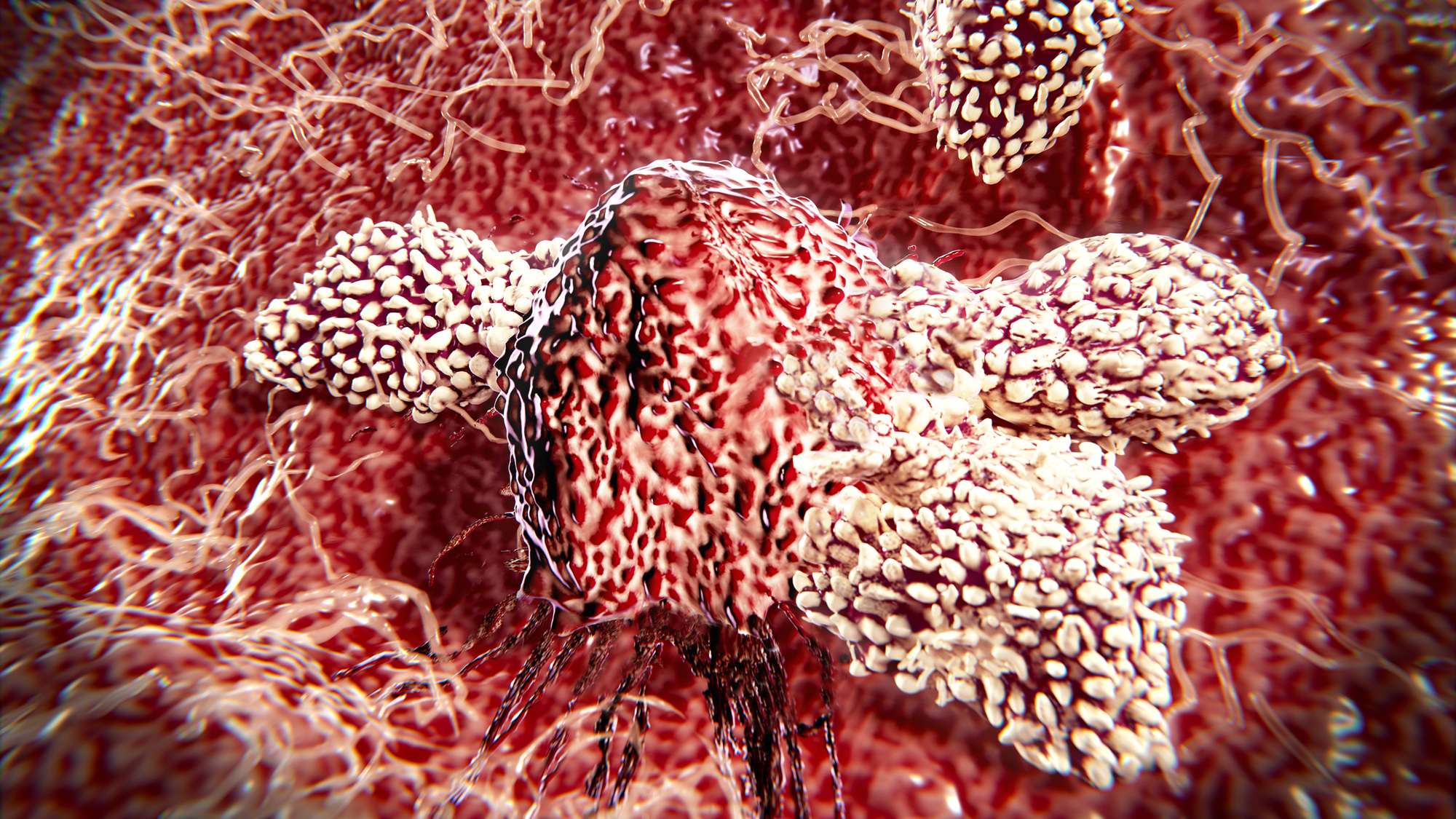New Biomarkers Predict Outcome of Cancer Immunotherapy

- T lymphocytes (white), activated through immunotherapy, attacking a cancer cell (red). (image: iStock.com/selvanegra)
Nowadays, melanoma and lung cancer can be combatted effectively through immunotherapy, which makes use of the immune system’s normal function of regularly scanning the body’s tissue for pathogens and damages. Specific inhibitors are used to activate immune cells in a way that makes them identify cancer cells as foreign bodies and eliminate them. This way, the immune system can boost its often weak immune response to allow it to even detect and destroy metastatic cancer cells. Immunotherapy thus makes it possible to control cancer cells in up to 50 percent of patients, in some cases even curing them altogether.
Not all patients respond to immunotherapy
However, around half of cancer patients do not respond to immunotherapy, but still have to put up with its side effects. A team of researchers from the University of Zurich and the UniversityHospital Zurich has now used a novel method to find out which patients are likely to respond positively to immunotherapy. The researchers were able to identify biomarkers in the blood that indicate whether the therapy is highly likely to be effective even before treatment is initiated.
“White blood cells of patients should be analyzed for these biomarkers when making a decision about immunotherapy. This has the potential to dramatically increase the percentage of patients who will benefit from this type of therapy,” says Professor Burkhard Becher from the Institute of Experimental Immunology at UZH. “At the same time, it makes it possible to directly move on to different therapeutic modalities in cases where immunotherapy won’t work – without losing valuable time.”
High-dimensional cell analysis
The researchers worked hand in hand with the Department of Dermatology of the UniversityHospital Zurich to examine biomarkers in 40 blood samples of 20 patients, both before and 12 weeks after immunotherapy. For this, they used the high-dimensional “cytometry by time of flight” (CyTOF) cell analysis method, which analyzes cells for up to 50 different proteins one cell at a time. The researchers were thus able to differentiate every single cell and document its activation status. Even subtle differences between the patient samples were observed in detail.
Recognizing molecular patterns
After analyzing the cells, the researchers examined the data together with employees of the Swiss Institute of Bioinformatics at UZH in terms of molecular patterns that could predict therapeutic success. “Even before the start of a therapy, we observed a subtle and weak immune response in the blood mediated by cancer, and identified a small subpopulation of white blood cells to coincide with better therapy outcome,” says Burkhard Becher. For the finding to be easily verifiable, the biomarkers should be detectable even in clinical routine laboratories; indeed, they validated their findings using conventional, routine methods in a second, independent cohort of more than 30 patients.
Dawning of precision medicine
“Together with comprehensive, precisely structured biobanking, this study represents a major step towards precision medicine,” says Professor Mitch Levesque of the Department of Dermatology at the UniversityHospital Zurich. This is also supported by UZH's University Research Priority Program Translational Cancer Research. Before they can be used clinically, the insights gained must now be applied in independent studies with higher patient numbers. The method using biobanking, high-dimensional cytometry, and computer-aided pattern recognition should also be useful in clinical decision support and developing new therapeutic approaches when it comes to other clinical pictures.
Literature:
Carsten Krieg, Malgorzata Nowicka, Silvia Guglietta, Sabrina Schindler, Felix J Hartmann, Lukas M Weber, Reinhard Dummer, Mark D Robinson, Mitchell P Levesque & Burkhard Becher. High-dimensional single-cell analysis predicts response to anti-PD-1 immunotherapy. Nature Medicine, 8 January 2018. Doi: 10.1038/nm.4466